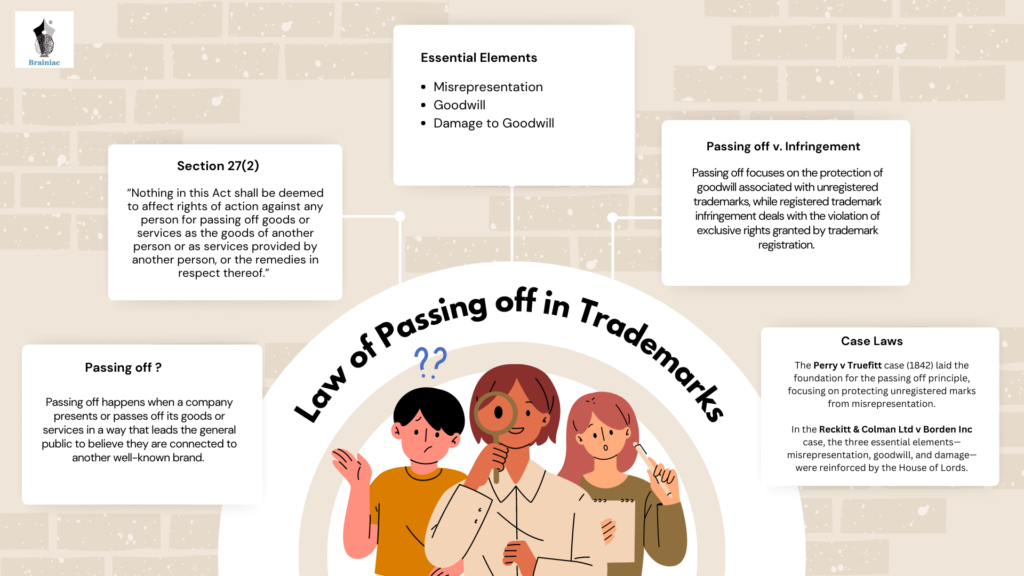Introduction
Protecting one’s intellectual property becomes crucial in the business world, where identities and reputations hold immense value. Passing off law is among the most effective legal mechanisms available to protect trademarks and prevent unethical competition. The legal doctrine of passing off protects against misrepresentation and the exploitation of another’s goodwill. This article examines the fundamentals of passing-off law, including its essential elements, defences, application to both unregistered and registered trademarks, and relationship with trademark infringement.
Essential Elements of Passing Off
To establish a case of passing off, certain elements must be present:
Misrepresentation:
Misrepresentation forms the core of passing off. It involves the defendant creating a false impression that their goods or services are associated with the plaintiff’s established brand. This misrepresentation can take various forms, such as using similar logos, packaging, or other elements that might confuse consumers into believing there is a connection between the two brands. It’s important to note that misrepresentation can be intentional or unintentional; what matters is that confusion is likely to arise among consumers.
For instance, if a new beverage company uses packaging and design closely resembling that of a well-known energy drink, consumers might mistakenly assume that the new product is affiliated with the established energy drink, even if there is no actual connection.
Goodwill:
Goodwill is the positive reputation and customer loyalty associated with a particular brand or business. It’s built over time through consistent quality, positive customer experiences, and effective marketing efforts. In the context of passing off, the plaintiff (the business claiming passing off) needs to demonstrate that their goods or services have developed a certain level of goodwill, making them distinctive and recognizable among consumers.
For example, a shoe company that has been known for its durable and stylish footwear over the years has earned goodwill among customers who recognize the brand for its quality and design.
In the case CIT v. B.C. Srinivasa Setty, it was determined that goodwill is affected by everything pertaining to the business, including the personality of the owners, the nature and character of the business, its name and reputation, its location, its impact on the current market, and the prevailing socioeconomic environment.
Damage:
The element of damage establishes that the misrepresentation has caused or has the potential to cause harm to the plaintiff’s goodwill and reputation. This harm can be in the form of financial loss or reputational damage. To successfully prove damage, the plaintiff must show that the misrepresentation has led to a diversion of customers or sales from the plaintiff’s business to the defendant’s, or that it has tarnished the plaintiff’s brand reputation.
Suppose a small bakery opens with a similar name, logo, and signage as a well-established bakery in the same neighbourhood. If customers start frequenting the new bakery thinking it’s an extension of the established one, the established bakery’s sales and reputation could suffer damage due to customer confusion.
Defences in Passing Off
Several defences can be raised against a passing off claim:
Use of Own Name –
Defendants have the right to use their own name, mark, or symbol without infringing on passing off if they take reasonable steps to avoid confusion. This defense recognizes the importance of personal identity and prevents unjust restrictions on individuals using their own names in business.
For example, if an individual named John Smith opens a restaurant called “Smith’s Diner,” even if another restaurant named “Smith’s Cafe” already exists in the same area, John Smith can use his own name as a defense against passing off claims.
Different Goods/Services –
If the goods or services offered by the plaintiff and defendant are substantially different, and there’s little to no possibility of confusion among consumers, this defense can be invoked. Passing off hinges on the likelihood of confusion, so if there’s no real risk of consumers mistaking one business for the other, passing off claims may not hold.
Imagine two businesses named “Fresh Fruits Market” operating in the same city—one selling fresh fruits and the other selling gardening tools. Since the goods being sold are distinct, the defense of different goods/services could be raised.
Lack of Goodwill – To establish a passing off claim, the plaintiff’s goods or services must have acquired a certain level of goodwill. If the plaintiff fails to demonstrate that their brand possesses a reputation or following among consumers, the passing off claim might be weakened.
For instance, if a new clothing store tries to claim passing off against a well-known fashion brand, but it can’t provide evidence of a loyal customer base or brand recognition, the defense of lack of goodwill could be relevant.
Consent – If the plaintiff has given explicit consent to the defendant’s use of a similar mark or representation, this can serve as a defense against passing off claims. Consent shows that the plaintiff knowingly allowed the defendant’s actions and therefore can’t claim misrepresentation.
Suppose a local artist grants permission to a café to use their artwork on its menu and signage. If the artist later tries to claim passing off, the café can use the defense of consent due to the pre-existing agreement.
Unregistered Trademarks & Passing Off
One of the distinctive features of passing off is its applicability to unregistered trademarks. While registered trademarks have statutory protection, passing off comes to the rescue of unregistered trademarks that have acquired goodwill over time. The Perry v Truefitt case (1842) laid the foundation for the passing off principle, focusing on protecting unregistered marks from misrepresentation. Over time, passing offs scope expanded from goods to services, trade, business, and even non-business activities. In the Reckitt & Colman Ltd v Borden Inc case, the three essential elements—misrepresentation, goodwill, and damage—were reinforced by the House of Lords.
Passing Off vs. Infringement
It’s important to differentiate passing off from registered trademark infringement. Passing off focuses on the protection of goodwill associated with unregistered trademarks, while registered trademark infringement deals with the violation of exclusive rights granted by trademark registration. Passing off requires proving misrepresentation, goodwill, and damage, while infringement assumes confusion when a registered trademark is used without authorization.
Conclusion
The law of passing off is an essential instrument for safeguarding a brand’s reputation and goodwill, which are intangible yet priceless assets. Passing off has developed to suit the demands of contemporary trade by extending to unregistered trademarks, diverse forms of trade, and competition. Although proving a case of passing off might be difficult, the theory protects brands’ integrity in a cutthroat market by serving as a barrier to unfair practices.


